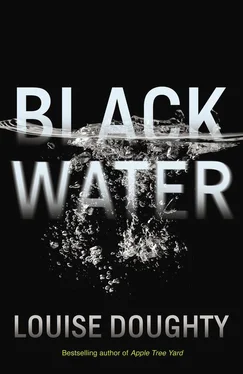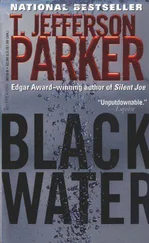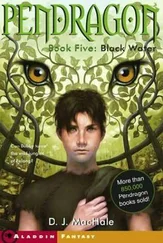After they had eaten, they walked along the beach. They talked about whether it was worth going for a drive around Sanur and decided it was mostly hideous and touristy. It grew greyer; the light was dull as they returned to the bar — as though the sky’s heaviness matched his mood.
Without discussion, they sat down in the same seats and both ordered soft drinks: she had watermelon juice and he a Coke, then they sat in silence, looking out at the sea where the waves crested apricot, the beach almost empty. He noticed a long trail of ants that were processing up the leg of the small table between them and clustering around a speck of satay sauce. The table hadn’t been wiped down properly while they were on their walk and he considered calling the waiter over.
In front of them on the sand was a pair of loungers in a reclining position. Between them was a standard lamp with a wooden stem and white lightshade of the sort you would find in any domestic sitting room. Even though they were still some way from dusk, a white-coated member of the hotel staff approached and turned the lamp on, and only then did Harper notice the cable that led from its base to the bottom of a nearby coconut palm. There was an electricity feed in the palm tree, a socket in its trunk. He glanced at Rita and saw she had noticed too and was also amused by how that small patch of beach had been transformed into a lounge. They smiled at each other. He wished he hadn’t made the call to Amsterdam, or asked about Jakarta. He wished he was no more than what Rita thought him to be.
*
As they walked back to the car, Rita perfectly happy, he felt annoyed with himself, and so did what most people do when they are upset about their own behaviour — he got upset with the person he was with. In the middle of a conversation about her work training secondary-school teachers, he interrupted with, ‘Of course all the good stuff here was built by the Dutch. The irrigation ditches in the fields used to be wood and bamboo but they went rotten. There’s a stone aqueduct in the highlands above town, you know, transformed the villages. You should go and see it.’
Why was he provoking her? He didn’t even believe it was true.
‘You mean the aqueduct above Keliki,’ she replied, her voice light. ‘I’ve seen it, of course, irrigation is everything. Only us Westerners take water for granted.’
‘Yes but the point I’m making is that if the Dutch hadn’t. .’
‘Oh, c’mon,’ she responded.
When he unlocked the car door for her and opened it, she slid herself down diagonally without looking at him.
He jammed the key in the ignition. She worked in education, so what? How about looking a little deeper? What about that caesarean scar on her abdomen, where was that child? He imagined a boy, a small boy, dying young perhaps — whatever it was, some common but excruciating tragedy that had led her to flee cold northern Europe and end up here, in a country so hot and full of flowers that sweat smelled sweet, deep greens and monsoon rains and slowly swaying people — the sort of country a white woman could run to because it was beautiful — because yeah, that’s right, I’ll go and live somewhere with lots of frangipani then I can convince myself the world isn’t ugly after all. He thought this last thought in a high-pitched voice in his head, a mockery of a female voice, of optimism of any sort.
They drove in silence.
They continued to drive in silence for an hour, the ribbon development along the road thinning little between villages: the open shacks with people sitting on the steps selling wooden tools and carvings and beads. They were most of the way back to town when Rita spoke and when she did, all at once with no preamble, it was obvious that throughout that hour of driving she had been continuing the debate between them to herself in just the same way he had. It was the worst kind of arguing: the silent kind.
‘How many killed in the Holocaust?’ she came out with. ‘How many? Six million, right? Everyone knows that. Even you know that.’
Thanks for that ‘even’, he thought. Thanks a lot.
‘Want to take a guess on how many of that six million were babies? Go on, take a guess. Of course the total dead was fifty million, in total I mean, everybody on all sides I mean, biggest category probably Russian soldiers but let’s stick with the babies shall we, the babies gassed and burned, out of six million people who just happened to be Jewish, no, how many babies?’
He conjured the image of a family being rounded up by the Gestapo. He watched the image in his head, like a flash of archive news footage in black and white, a sturdy father in a long black coat, a mother white-faced with fear, six or eight children, perhaps? A baby, clutched in the arms of the eldest daughter because the mother had her hands full helping the smaller children into the back of a truck with its tailgate down. The father and the eldest boy were lifting up suitcases and then turning to assist a group of elderly people who were waiting patiently behind the family. A young soldier stood next to them, holding a rifle. One baby, perhaps, in a group of twelve or fourteen?
‘I have absolutely no idea,’ he said, allowing — and that was a mistake — the hint of a sigh to enter his voice. Six million divided by fourteen. Did she really want him to do that particular calculation? Why was she bringing this up anyway?
‘Guess,’ she insisted.
‘I don’t know, three hundred, four hundred thousand. Are you serious?’
‘One million,’ Rita replied. ‘In the war on our continent in the middle of the century we happen to live in right now, the continent of the Renaissance and mass industrialisation and the vote and penicillin, we killed one million babies. Not out of ignorant prejudice at all, it was perfectly knowing and industrial. We put all that progress we’re so proud of to very good use. In living memory.’
Harper allowed a silence to speak the phrase, and your point is?
The village street was busy and he had slowed the car to a crawl because there was a man on a bicycle just ahead and to his left. The bicycle had two wooden cages of squashed chickens with dirty-white feathers slung either side of the saddle, held together by string. The man was standing up on the pedals as he cycled in his sarong and as they drew level, he glanced over his shoulder, slowed, then wobbled and fell against the side of the car. The cage scraped against the car door, sending the poor skinny chickens into a constrained flurry of panic.
‘Fuck!’ He braked more savagely than he needed to. He was flung against the steering wheel then back in his seat, momentarily winded.
Rita was wearing her seatbelt. She jerked forward a few inches before it caught her and pushed her back again. She sat while he recovered his breath, then said in a low, conciliatory voice, ‘A million of them, John, in living memory, and with industrial efficiency. Do you really think Europeans are in any position to lecture any other culture about barbarism?’
He drove straight through town and out the other side. She did not question where he was going. The road remained good for twenty minutes after town and then he turned the car off onto the poor, potted track. He wouldn’t be able to drive right up to the hut. The track ran beneath, and then they would have to cut up on foot along a narrow path that joined the one down to the river.
When he parked the car, she was still silent, so to break the tension he said, ‘Here’s where I am staying.’ He was about to ask, politely, if she wanted to see it or go back to town but before he could, she had opened her door. He had parked on a steep camber and she had to lever both hands against the doorframe to clamber out.
Читать дальше












